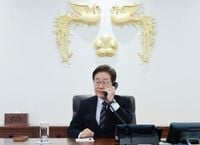On August 20, 2025, the landscape near the Sino-Korean border was alive with the hum of construction. According to Xinhua and Dongbang Ilbo, Chinese railroad workers were hard at work at a site that stretches across the border region between Hubei Province’s Qian’an and Hunan Province’s Shangqiu cities. The project, known as the Xiongshang High-Speed Railway, is a major undertaking: the main line covers a whopping 552 kilometers, and the section currently under intensive development spans about 350 kilometers. For those familiar with China’s ambitious infrastructure plans, this is just the latest in a series of bold, cross-regional projects designed to knit the country’s vast territories together and, perhaps, to project influence closer to its neighbors.
But just as steel rails were being laid down across the borderlands, political tremors were being felt further east. In South Korea, President Lee Jae-myung was preparing for a high-stakes summit with Japanese Prime Minister Ishiba Shigeru, scheduled for August 23 and 24. The backdrop? A complex web of historical grievances, ongoing security challenges, and the ever-present shadow of North Korea’s nuclear ambitions.
President Lee’s stance on these issues has been anything but ambiguous. In a solo interview with Yomiuri Shimbun published on August 21, he addressed head-on the sensitive agreements made by previous South Korean governments with Japan—particularly those concerning reparations for wartime forced labor and the so-called "comfort women." Lee acknowledged the pain these issues cause among South Koreans, calling the deals struck by earlier administrations "very difficult for the Korean people to accept." However, he added, "As a nation, it is not desirable to overturn what has been promised." Lee’s remarks reflected a delicate balancing act: honoring international commitments while recognizing the lingering wounds at home.
"The issue of past history is very painful for our people," Lee said, "but policy consistency in inter-state relations is a very important principle." He continued, "We must uphold this principle and, at the same time, gain greater empathy from the victims and our people. Only then can we ensure sustained momentum." For Lee, this means not only respecting the 2015 agreement between Seoul and Tokyo—an agreement that has been criticized for failing to secure broad public support or acceptance from victims—but also pushing for solutions that restore victims’ honor and dignity. "Apologies should be made sincerely until the wounded hearts are healed," he stated, emphasizing the need for genuine remorse and practical redress.
Yet, as the summit approached, another issue loomed large: defense cooperation and missile deployment. On August 21, Lee, who leads South Korea’s main opposition party, drew a firm line in the sand regarding security talks with Japan. As reported by Sisaweek, Lee declared, "There will be no compromise on the issue of defense cooperation and missile deployment with Japan." He insisted that South Korea should not cave to what he described as "excessive demands" from Tokyo and warned against yielding to pressure on matters of national security. "The issue of defense cooperation is a matter of national sovereignty," Lee said, adding that "the Japanese government has not changed its stance since 2015."
Lee’s criticisms extended to the Japan-South Korea security cooperation talks set for August 23 and 24. He described the negotiations as lacking in progress and failing to reflect South Korea’s interests. "South Korea must establish a firm stance on defense cooperation, missile deployment, and related issues," Lee asserted, making it clear that, from his perspective, Seoul should not be swayed by diplomatic overtures that do not prioritize its own security needs.
All of this unfolds against a backdrop of growing regional uncertainty. North Korea’s nuclear program remains a persistent threat, and both Seoul and Tokyo are acutely aware of the need for a coordinated response. President Lee offered a phased approach to the denuclearization problem, outlining a strategy of "freeze, reduction, and elimination." He explained, "The Korean government will maintain close cooperation with the United States and, through active inter-Korean dialogue, create conditions that can lead to the freezing, reduction, and eventual elimination of nuclear weapons." This step-by-step plan is rooted in pragmatism, recognizing that a sudden or unilateral resolution is unlikely in the current climate.
Economic cooperation was also on the agenda, with Lee highlighting the upcoming 60th anniversary of normalized diplomatic relations between South Korea and Japan. He stressed the need for a "future-oriented economic and trade partnership" that goes beyond previous levels of collaboration. "Korea and Japan need to create a groundbreaking economic cooperation relationship that surpasses the level of cooperation so far," Lee noted, pointing to the potential for deeper ties if both sides can navigate the historical and security-related minefields.
Meanwhile, the construction of the Xiongshang High-Speed Railway continues apace, symbolizing China’s drive for regional integration—and perhaps, in the eyes of some, its growing strategic reach. The railway, designed for speeds of up to 350 kilometers per hour, is expected to serve as a vital link between Hebei Province’s Xiong’an New Area and Henan Province’s Shangqiu City, knitting together economic zones and facilitating the movement of people and goods. It also brings China’s infrastructure development closer to sensitive border areas, a fact not lost on neighboring countries.
As these parallel developments unfold—one physical, the other diplomatic—the region finds itself at a crossroads. The high-speed railway represents progress and connectivity, but it also raises questions about influence and control in a strategically vital area. At the same time, the diplomatic dance between Seoul and Tokyo highlights the enduring challenges of history, sovereignty, and security in Northeast Asia.
In the end, the coming days will test the ability of leaders to balance national interests with the demands of diplomacy and the expectations of their citizens. Whether it’s the laying of tracks across a border or the attempt to bridge historical divides, the effort to build something lasting continues—sometimes with sparks, sometimes with setbacks, but always with the hope of a more stable and prosperous future.




